- Home
- S. J. Parris
Giordano Bruno 01 - Heresy Page 10
Giordano Bruno 01 - Heresy Read online
Page 10
The rector’s face filled with fear again.
“No!” he said fiercely, gripping my shoulders. “The disputation must go ahead. We cannot allow this incident to disrupt a royal visitation—can you imagine the consequences, Doctor Bruno? Especially if it were rumoured to be”—he glanced around before whispering the word—“deliberate. The college would be tainted and my reputation with it, and we have already had so much trouble here lately, I fear Leicester’s displeasure more than I can tell you.”
“But a man has been brutally killed—perhaps murdered,” I protested. “We cannot go about our business as if nothing has happened.”
“Shh! For the love of Christ Jesus, do not repeat that dreadful word murder, Bruno.” The rector looked frantically about the garden and lowered his voice, though we were still alone. “We will have it announced that this was a tragic misfortune. We shall say”—he paused briefly to compose his story—“yes, we shall say that the garden gate was left open and a stray dog got in and attacked Roger, who had got up early to pray and meditate in the grove.”
“Will this be believed?”
“It will if I say it was the case—I am the earl’s appointed rector,” said Underhill, a touch of his old pomposity returning. “Besides, it was dark and misty and no one saw clearly.” There was a hardness in his face now, and desperation. I saw then his determination to preserve the college’s good name at any price, and imagined this same ruthlessness must have ruled him during the trial of the hapless Edmund Allen.
“But the locked gates—” I protested.
“Only you and I know about the locked gates, Bruno. I see nothing to be gained from mentioning them at present, if you wouldn’t mind.”
“What about the porter? Will he not remember checking the gates at night?”
The rector gave a dry laugh. “I see you are not acquainted with our porter. A clear head and a sharp memory are not his strong points. If I say a gate was left open, he could not for certain claim otherwise. No, I think this is our safest course.”
Seeing my look of concern, he squeezed my shoulder and added, in a lighter tone, “If all suspicion is hushed up, it will be the easier to investigate what really happened here this morning. But if there is a great fuss, and all Oxford is abuzz with the idea that Lincoln is a place of savage murder, the perpetrator—if indeed there is a perpetrator—will surely disappear in the hubbub. If justice is to be served, we do best not to shout this tragedy from the tower. I would be most grateful for your help in this matter, Doctor Bruno.”
I was not sure whether he meant the matter of disguising the truth or of uncovering it, but I was sorely troubled by the thought that I may well have been the last person to see Mercer alive, and that whoever had planned his vicious end was at that moment at liberty somewhere in Oxford, perhaps exulting in his success. The rector’s cold briskness had shocked me, too; his human response to his colleague’s awful death seemed swallowed up in fear for his office.
The sky had grown paler and the mist was thinning, lingering only in ragged shreds among the trees. The two corpses in the dewy grass had acquired a stark solidity with the grey light. The rector glanced up anxiously.
“Dear God—it will be almost time for chapel! I must be there to speak, reassure the community. Already the story will be growing.” He twisted his fingers together until the knuckles turned white, speaking as if to himself. “First I must order the kitchen servants to bring a sack for that carcass, it cannot stay here.”
I stared at him, appalled, until he noticed my expression.
“The dog, Bruno! But you are right—the coroner must be fetched before the body can be removed. Oh, there is too much to do! I will have to ask Roger—” Then he clapped his hands to his mouth and turned back to look at the corpse, as if only now comprehending the loss of his deputy.
“Oh, God,” he whispered. “Roger is dead!”
“That’s right,” I said, watching him absorb the truth of it.
“But then this means there will have to be another congregation, another election for subrector, and there is no time to convene—but in the meantime I must have someone to act under me, and that will occasion all the usual petty jealousies and ill feeling, just when we do not need them. Oh, how could this have come to pass?” Trying to contain his mounting fears, he turned to me with an earnest expression, his hands flapping helplessly at his sides. “Doctor Bruno—this is a dreadful thing to ask of a guest, I know, but would you stay with poor Roger’s body until the coroner can be brought? I must make the sad announcement of this morning’s events in chapel in such a way that quiets the reports of it, if that is possible. Keep the students out—we do not want them crowding in here to satisfy their ghoulish curiosity as if it were a bearbaiting.”
“Of course I will stay,” I said, hoping my vigil would not be a long one; though I am not superstitious about the dead, the empty stare of Roger Mercer’s sightless eyes seemed to accuse me for my failure to help him. “Our fears are for our poor, weak flesh,” he had said the night before. Now he had looked that fear full in the teeth; I still remembered his cracked voice crying to Jesus and Mary to save him.
The rector scuttled off across the grass in the direction of the courtyard, and I was left alone with the bodies and my whirling thoughts. While I waited for them to settle into some semblance of order, I bent again to Mercer’s corpse and lifted what remained of his tattered gown to cover his ravaged face. Superstition says that the eyes of a murder victim retain the image of his killer, but as I looked at Mercer’s terrified stare for the last time I thought: If such foolishness were true, would I see the image of the great dog? But the fact of the locked gates stubbornly persisted; the dog was not Mercer’s true killer, only his agent. I moved again from Mercer’s body to the dog’s to examine it. It was a huge brute, the height of a man’s waist, with a long, narrow head. I noted again how thin it was, though it did not look otherwise abused. Whoever had loosed this dog in here must have planned the event carefully, increasing the force of the attack by keeping it desperately hungry for some days beforehand, by the look of it. And Roger’s heavy purse—which the rector had taken—suggested he had been expecting to meet someone to effect some kind of transaction. But if the money had been at the centre of a dispute in which Roger had fallen out with someone so badly that they could wish to kill him, I could not fathom why the purse had been left. It would seem that the money had been less of a priority than Mercer’s death, though it must have been key to the meeting he anticipated.
I considered again the layout of the garden. It was abutted on the north side by the kitchen part of the way, though I could see no door from the kitchen into the garden. On three sides it was enclosed by a wall at least twelve feet high, and on the fourth it adjoined the east range of the college, the side of the quadrangle that housed the hall and the rector’s lodgings. I presumed Mercer had entered the garden through one of the two passageways either side of the hall, letting himself in with his own key. Had he then locked the gate behind him, so as not to be disturbed, or had someone waited for him to enter before locking the door from the college side, leaving him unwittingly shut in? Could that have been the same person who then opened the gate from the lane through which the dog—presumably muzzled until the last moment—had been released, locking that behind the animal? But it would have taken a good few minutes to run out of the main gate and around the side of the building, and anyone doing so would have been seen by the porter—assuming he had been awake.
From the courtyard a bell tolled dismally to rally the scholars to chapel, where the rector would spread his benign reassurance and dispel the young men’s more lurid imaginings. As I rose to my feet, I wondered idly if James Coverdale would finally achieve his ambition of becoming subrector, and a thought struck me like a cold blade. The rector had asked, rhetorically, who would want to harm Roger Mercer, and I had replied that I had no idea. But now that I considered the proposition I realised that even I, a stranger who had n
ot been in the college one full day, had already encountered two people who apparently hated him. Might there not be more? Perhaps one of them tried to extort money from him and decided instead to kill him. I had found him a genial enough man, but it seemed his part in the trial of the unfortunate Edmund Allen had aroused resentment. Who was to say how many other enemies he might have made? But these resentments must have simmered for a long time. Why wait until the week of a royal visitation to act on them? Unless—
I was interrupted in my pursuit of this new trail by the sight of a figure running toward me through the trees from the direction of the college. I stepped forward in the hope that the coroner had arrived to relieve me of my duties, and was surprised to recognise Sophia Underhill, dressed in a thin blue gown with a shawl around her shoulders, her hair flying out behind her. She halted a few yards away, looking equally surprised to see me.
“Doctor Bruno! What—what are you doing in here?”
“I was—waiting for your father,” I said, taking another step toward her in the hope of guiding her away from the two corpses.
“They said Gabriel Norris shot down an intruder,” she said, her face flushed with the drama of the moment. “Is he still here?” Her eyes were bright with eager anticipation as she looked around wildly, but I noticed she was twisting her hands in agitation in the same manner as her father.
“Not quite.” I almost smiled; despite the rector’s best efforts, it seemed the tale was already growing in the telling. “You have not spoken to your father?”
“He is at morning prayers in chapel—I heard the news from two scholars who were running there late,” she said, peering past me to where the shapes lay in the dense grass. “Of course we heard all the noise from our windows but I never imagined—is that the thief’s body there?” She seemed keen to take a look; I planted myself firmly in her path.
“Please, Mistress Underhill, you must keep back. It is not a sight you should see.”
She tilted her head and stared at me defiantly.
“I have seen death before, Doctor Bruno. I have seen my own brother with his neck broken. Do not treat me like one of these pampered ladies who has never been out of a parlour.”
“I would not dream of it, but this is worse,” I said, holding my arms out absurdly as if this might obscure the sight. “Well, not worse than one’s brother, I don’t mean—I mean only, it is very bloody, not something a woman should see. Please trust me, Mistress Underhill.”
At this she snorted, and placed her hands on her hips.
“How is it that men think women are too frail to look on blood? Do you forget we bleed every month? We push out babies in great puddles of gore, do you imagine we hide our eyes when we do that, in case it offends our delicate senses? I promise you, Doctor Bruno, any woman can look on blood with more fortitude than a soldier, though men think we must be treated like Venice glass. Do not be one more who wants to wrap me up in linen and keep me in a box.”
I was surprised by the ferocity of her argument, and conceded that she had a point. Even so, I had been charged with protecting Mercer from prurient eyes, so I stepped forward again until I was standing directly in front of her, only a few inches away. It was disconcerting to find that she was almost as tall as me.
“I would not dream of it. Nevertheless, Mistress Underhill, I beg you not to go any closer—this body is badly mutilated. I fear it would be distressing, however strong your constitution.”
She stood her ground for a moment longer, and then her instinctive propriety dictated that she step back. The defiant expression was replaced by one of anxious curiosity.
“What happened, then?”
“A man was savaged by a wild dog. Norris shot the dog, not the man.” Her brow creased. “A dog? In the garden? Wait—” She shook her head, flustered, as if she had her questions all in the wrong order. “Which man?”
“Roger Mercer.”
“Oh, no. No!” she repeated, one hand clasped to her mouth, the other to her breast. “No!” Her eyes darted about wildly, resting nowhere, then she sank slowly to the ground, her skirt billowing around her, her hand still pressed to her mouth. I was unsure if she was about to cry or faint, but her face was drained of all colour. “Oh God, it can’t be.”
I crouched beside her and laid a tentative hand on her shoulder.
“I am sorry. You were fond of him?”
She looked up at me with a fleeting expression of puzzlement, then nodded emphatically.
“Yes—yes, of course—this is my home, the senior Fellows here have been like family to me these past six years,” she said, her voice shaky. “I cannot believe something so horrible could happen here in college, just below our windows too. Poor, poor Roger.” She glanced past me to the heap in the grass and shuddered. “If only—” She broke off, pressing the edge of her thumb to her mouth again.
“If only?” I prompted.
But she merely shook her head and cast her eyes around again frantically. “But where is Master Norris?”
“Your father sent him to change. His attire was apparently unsuitable.”
She gave a soft, indulgent laugh then, and I felt a sudden unexpected pang of jealousy. Was she fond of the dandyish young archer?
“A dog, though?” she mused, running her hands through her hair as if thinking aloud, her expression troubled again. “Where did it come from?”
“The gate to the lane must have been left open during the night—it looks as if some stray found its way in and was so starving it would set upon anything,” I said, as evenly as I could.
Sophia’s eyes narrowed. “No. That gate is never unlocked. Father is paranoid about vagabonds and trespassers getting in at night, or undergraduates using it to meet the kitchen girls—he checks it every evening at ten before he retires. He would no more forget the gate than he would forget his prayers or his work. That cannot be.”
“Perhaps he left that task to the porter last night, as he had to attend to our supper,” I suggested, thinking how absurd it was that I should be defending the improbable falsehood when I wanted to compare her suspicions with my own. “I hear the porter is an unreliable old drunk.”
She looked at me then as if she were disappointed in me.
“Cobbett is an old man, yes, and he likes a drop now and again, but he has been at the college since he was a boy and if my father had entrusted him with such a task he would rather die than let the rector down. He may be only a servant to you, Doctor Bruno, but he is a kind old man and does not deserve to be spoken of with contempt.”
“I am truly sorry, Mistress Underhill,” I said, chastened. “I did not mean—”
“You had better call me Sophia. Whenever I hear Mistress Underhill called, I look around for my mother.”
“Your mother did not hear the commotion this morning?”
“I don’t know, she is in bed.” Sophia sighed. “She is in bed most of the time, it is her chief occupation.”
“I think she carries a great weight of sadness since your brother’s death,” I said gently.
“We all carry a great weight of sadness, Doctor Bruno,” she snapped, her eyes flashing. “But if we all hid under the counterpane pretending the sun no longer rose and set, the family would have fallen apart. What do you know of my brother’s death, anyway?”
“Your father made a brief account last night. It must have been unbearable for you.”
“It would be unbearable to lose a brother in any case,” she said, in a milder tone. “But I was given unusual liberties while John lived because he spoke up for me, he insisted that I should be his companion in all his pursuits and treated as his equal. Without him, I am forced to behave like a lady and I must confess I do not take to it at all.”
She laughed unexpectedly then and I was greatly relieved, but her laughter trailed off into silence and she began plucking at the grass distractedly.
“I suppose your disputation today will be postponed because of this?” she asked, gesturing vaguely toward the
mound of Mercer’s body as if she did not much care either way.
“No indeed—your father is determined not to disappoint the royal guest. We shall go ahead as planned, he says.”
Her face lit up with anger again—her temper was as changeable as the weather over Mount Vesuvius, it seemed—and she rose to her feet, brushing down her dress with quick, furious strokes.
“Of course he does. No matter that someone has died, terribly—nothing must interrupt college life. We must all pretend nothing is amiss.” Her eyes burned with fury. “Do you know, I never saw my father shed one tear when my brother died, not one. When they brought him the news, he just nodded, and then said he would be in his study and was not to be disturbed. He didn’t come out for the rest of that day—he spent it working.” She spat this last word.
“I have heard,” I said hesitantly, “that Englishmen find this mask necessary to hide what they feel, perhaps because it frightens them.”
She made a small gesture of contempt with her head. “My mother hides in her sheets; my father hides in his study. Between them, I am sure they have almost managed to forget they had a son. If only they did not have the inconvenience of my presence to remind them.”
“I am sure that is not the case—” I began, but she turned away and set her mouth in a terse line. “What is this work in which your father buries himself?” I asked, to break the silence.
“He is writing a commentary on Master Foxe’s Actes and Monuments of These Latter and Perillous Days,” she said, with some disdain.
“Ah, yes—The Book of Martyrs,” I said, remembering that someone at dinner had mentioned the rector preaching on this subject. “Does it need a commentary? Foxe is quite prolix enough on his own, as I recall.”
“My father certainly thinks so. Indeed, my father thinks its need for a commentary is more pressing than any other business in the world—except perhaps his endless meetings of the college board, which are nothing but an excuse for gossip and backbiting.” She pulled a handful of leaves from the branch overhead with special vehemence as she said this, then lifted her head to look at me. “These are supposed to be the cleverest men in England, Doctor Bruno, but I tell you, they are worse than washerwomen for the pleasure they take in malicious talk.”

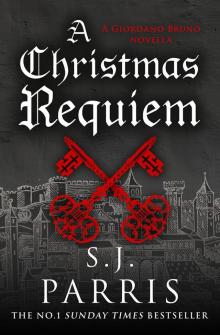 A Christmas Requiem
A Christmas Requiem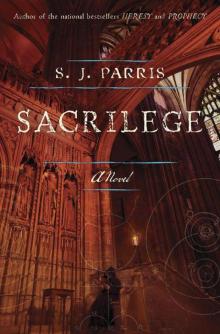 Giordano Bruno 03 - Sacrilege
Giordano Bruno 03 - Sacrilege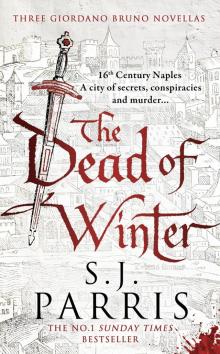 The Dead of Winter: Three gripping Tudor historical crime thriller novellas from a No. 1 Sunday Times bestselling fiction author
The Dead of Winter: Three gripping Tudor historical crime thriller novellas from a No. 1 Sunday Times bestselling fiction author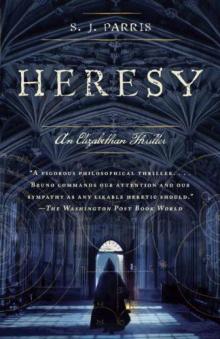 Giordano Bruno 01 - Heresy
Giordano Bruno 01 - Heresy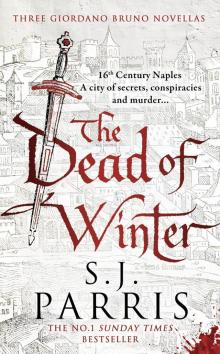 The Dead of Winter
The Dead of Winter Treachery (2019 Edition)
Treachery (2019 Edition)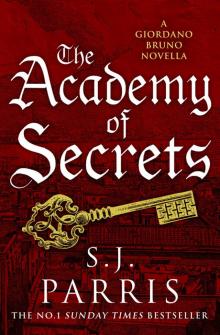 The Academy of Secrets
The Academy of Secrets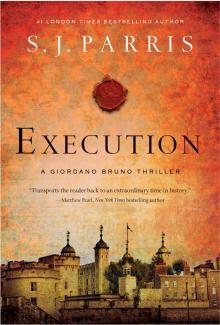 Execution
Execution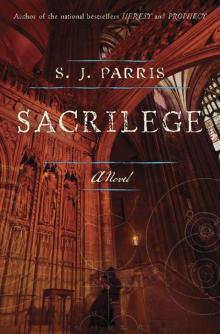 Sacrilege: A Novel
Sacrilege: A Novel Prophecy
Prophecy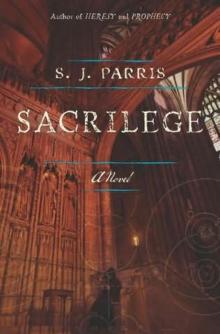 Sacrilege gb-3
Sacrilege gb-3 Prophecy (2011)
Prophecy (2011) Treachery
Treachery Prophecy gb-2
Prophecy gb-2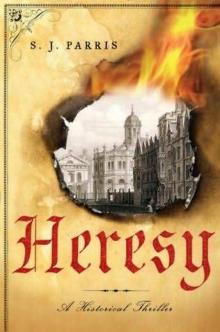 Heresy
Heresy